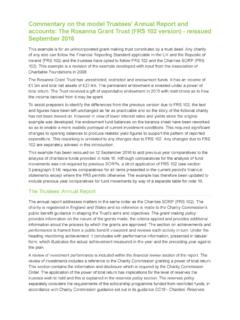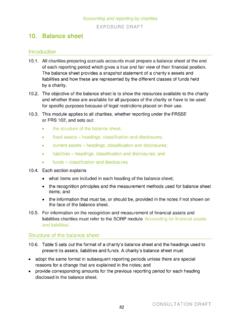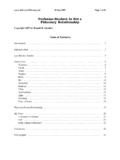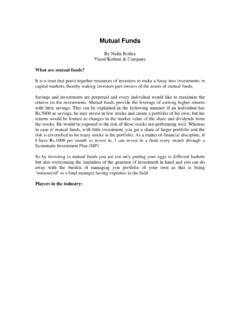Transcription of 1. Trustees’ annual report - Charities SORP
1 Accounting and reporting by charities1. Trustees annual reportOverview and the purpose of the trustees annual The primary purpose of the trustees annual report (the report ) is to ensure that the charity is publicly accountable to its stakeholders for the stewardship and management of the funds it holds on trust. The trustees should consider the information needs of the primary users of their report . These may vary from charity to charity but will normally include funders, donors, financial supporters, service users and other The report should be a coherent document that meets the requirements of law and regulation. It should provide a fair, balanced and understandable review of the charity s structure, legal purposes, objectives, activities, financial performance and financial position. Good reporting explains what the charity is set up to do, how it is going about it, and what is achieved as a result of its work.
2 The report should assist the user to make economic decisions in relation to the charity and to assess the charity s progress against its objectives and to understand its plans in relation to its For the report to be prepared in accordance with this SORP, Charities are required to comply with all the applicable reporting requirements prefixed with a must . This module distinguishes those requirements that all Charities must comply with from those more detailed reporting requirements applicable to larger Charities subject to Trustees of charitable companies must also prepare a directors report as required by company law. A separate trustees annual report is not required provided that any statutory directors report prepared also contains all the information that this SORP requires to be provided in the trustees annual report . UK charitable companies that qualify as medium or large companies must provide a strategic report that meets the requirements of company law.
3 For more information see the SORP module Charities established under company law . Legal requirements and the requirements of this SORP do not limit the inclusion of other information within the report or the provision of additional information accompanying the accounts (financial statements). A charity may include other relevant material in the report , for example a Chairman s report , an environmental report , or an impact assessment. FRS 102 does not specify any requirements for narrative reporting though the Financial Reporting Council (FRC) does issue guidance on the strategic report . This module specifies this SORP s requirements for a trustees annual report and its This module sets out: who is responsible for preparing the trustees annual report ; reporting by smaller Charities ; the context for reporting; the content of the trustees annual report required of all Charities ; the provision of other information; and the additional content required of larger and reporting by charitiesWho is responsible for preparing the trustees annual report ?
4 The responsibility for preparing the report rests with the charity s trustees. Although trustees may seek the assistance of the charity s staff or advisers in drafting the report , the trustees must approve the final text of the The report provides important accompanying information to the accounts and therefore should be provided whenever a full set of accounts is distributed or otherwise made available. The report must identify the reporting period (financial year) of the charity to which it relates and the date of its approval. One or more of the charity s trustees must sign and date the report on behalf of the trustees upon their approval of the by smaller The reporting requirements take account of the size of the charity. Less information is required of smaller Charities . Smaller Charities are those not subject to statutory audit under charity law in their jurisdiction(s) of formation, operation or registration.
5 This module uses the term all Charities to identify those elements of the report that both smaller and larger Charities must Smaller Charities are encouraged to include some or all of the additional information required of larger Charities if the charity trustees consider such additional information relevant to their charity s context for The report provides an essential link between a charity s legal purposes and the charity s aims and objectives and the activities it undertakes to achieve them. It should focus on information relevant to the charity s stakeholders and tell the charity s story in a balanced manner, acknowledging both significant successes and failures. Trustees may present the contents of their report in any order and under any headings that they Good reporting provides a context within which to interpret the accounts and links the activities and achievements reported with the sources of income used to finance them and the expenditure incurred on those activities.
6 A charity s accounts focus on its financial position and financial performance. In isolation this information does not give the user a rounded overview of what has been achieved from the charity s activities and the resources used in their delivery. The report and accounts taken together should provide a picture of what the charity has done (its outputs) or achieved (its outcomes), or what difference it has made (its impact). Parent Charities preparing consolidated accounts must expand their report to include relevant information about their subsidiary and reporting by charitiesThe content of the trustees annual report required of all The SORP s requirements that all Charities must follow are set out in the following headings: objectives and activities; achievements and performance; financial review; structure, governance and management; reference and administrative details; exemptions from disclosure; and funds held as custodian trustee on behalf of The headings used in the report may be amended to fit the preferences of the charity provided the information required by this module is clearly presented in the Larger Charities must also refer to the section The additional content required of larger Charities for their report to be compliant with the and The report provides information intended to help the user understand how the charity s aims fulfill its legal purposes, the activities it undertakes and what it has achieved.
7 All Charities must provide a summary of: the purposes of the charity as set out in its governing document; and the main activities undertaken in relation to those Charities in England and Wales must also: explain the main activities undertaken to further the charity s purposes for the public benefit; and include in their report a statement confirming whether the trustees have had regard to the Charity Commission s guidance on public The report should explain the activities, projects or services identified in the accompanying accounts. As far as practicable, numerical information provided in the report about the resources spent on particular activities should be consistent with the analysis provided in the and The report must contain a summary of the main achievements of the charity. The report should identify the difference the charity s work has made to the circumstances of its beneficiaries and, if practicable, explain any wider benefits to society as a and reporting by charitiesFinancial The report must contain a review of the charity s financial position at the end of the reporting The charity must explain any policy it has for holding reserves and state the amounts of those reserves and why they are held.
8 If the trustees have decided that holding reserves is unnecessary, the report must disclose this fact and provide the reasons behind this If, at the date of approving the report and accounts, there are uncertainties about the charity s ability to continue as a going concern, the nature of these uncertainties should be The report must also identify any fund or subsidiary undertaking that is materially in deficit, explaining the circumstances giving rise to the deficit and the steps being taken to eliminate the , governance and The report must provide details of: the nature of the governing document ( trust deed, memorandum and articles of association, Charity Commission scheme, Royal Charter, etc.); how the charity is (or its trustees are) constituted ( limited company, unincorporated association, trustees incorporated as a body, charitable incorporated organisation, community benefit society, industrial and provident or friendly society etc.)
9 ; and the methods used to recruit and appoint new charity trustees, including details of any constitutional provisions for appointment, for example election to post. Where any other person or external body is entitled to appoint one or more of the charity trustees, the report should explain this and give the name of that person or Charities may withhold certain governance and management details where the criteria for exemption from disclosure are satisfied (see Exemptions from disclosure ).Reference and administrative The report must provide the following reference and administrative information about the charity and its trustees: the name of the charity, which in the case of a registered charity means the name by which it is registered; any other name which the charity uses; the charity registration number(s) for the jurisdiction(s) in which it is registered as a charity and, if applicable, its company registration number; the address of the principal office of the charity and, in the case of a charitable company, the address of its registered office; the names of all those who were the charity s trustees on the date the report was approved or who served as a trustee in the reporting period;Accounting and reporting by Charities where a charity has any corporate trustees, the names of the directors of the body corporate on the date the report was approved.
10 And the names of any trustee for the charity holding the title to property belonging to the charity (for example custodian trustee or nominee) on the date the report was approved; or who served as a trustee for the charity in holding the title to property belonging to the charity in the reporting Charities may withhold certain reference and administrative details where the criteria for exemption from disclosure are satisfied (see Exemptions from disclosure ).Exemptions from On occasions, the disclosure of the names of trustees or of the charity s principal address or the disclosure of the name(s) of any chief executive officer or other senior staff member(s) could lead to that person (or others) being placed in personal danger ( in the case of a women s refuge). In such circumstances, the applicable law and regulations may permit the withholding of these details. Where a report omits the name of a trustee , chief executive officer or senior staff member or the charity s principal address, it should give the reason for the Charities in England and Wales may omit the names of those persons and the charity s principal address from their report provided the Charity Commission has given the charity trustees the authority to do this.















